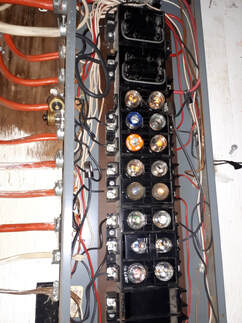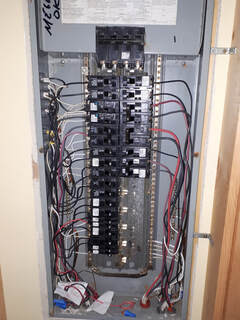Mike's Home Inspector BlogMichael Burfitt |
|
It’s a common horror movie cliché that a fuse blows and needs to be replaced in a dark, cold basement. In reality, however, most of what I and other local inspectors see during inspections are circuit breakers, an example of which is pictured below and looks like a series of light switches. There are two basic types of overcurrent protection: fuses and circuit breakers. If I see fuses in a service panel, I will always advise getting an electrician to evaluate the system and generally recommend it should be replaced with modern panel with circuit breakers. What’s wrong with fuses? There are several concerns:
Fuses Have to Be Replaced While a tripped circuit breaker can simply be switched back on, a fuse must be replaced. This can not only be expensive, but often requires a trip to the hardware store at the most inconvenient time. The flip side of this is that it requires to homeowner to determine why it is happening repeatedly rather than just repeatedly flipping a switch. Unfortunately..... Fuses Are Usually Interchangeable This means that different fuses (such as 15 vs 20 amp) are the same size. The problem with this is that homeowners frequently replace a repeatedly melting fuse with a larger size. While on the surface this solves the problem this is a very dangerous practice, and it allows a circuit to carry more current than can be safely handled which can lead to an electrical fire. Fuse Panels are (Generally) Obsolete If you read my previous blog post on Knob & Tube wire, you would know that K&T is dangerous mainly because of how old it is. Fuses have not been used in homes (except in rare conditions) since the 1970s and nearly all are past their expected lifespan. Insurance Issues Many insurance companies look negatively on a fuse box, mainly for the last two reasons I just stated. While beyond the scope of a home inspection, I have heard plenty of stories of insurers demanding electrical systems be upgraded to a modern circuit breaker as a condition of writing a policy on a home. It’s not as simple as saying fuses = bad and circuit breakers = good. In fact, fuses are better at preventing over currents and, while very reliable, circuit breakers still are not 100% foolproof. Our heat pump (installed in 2020) also uses a fuse for one simple reason: they react much faster to a power surge and can protect the unit from catastrophic damage far better. This is why a home inspector will recommend an electrician: I’ve said it before, and I will say again that electrical systems can be very dangerous and more complicated than they appear. |
Archives
July 2024
Categories
All
|
|
Inside Edge Home Inspections Ltd.
Halifax, NS 902-209-9921 [email protected] Proudly Serving the HRM & Central Nova Scotia |



 RSS Feed
RSS Feed

